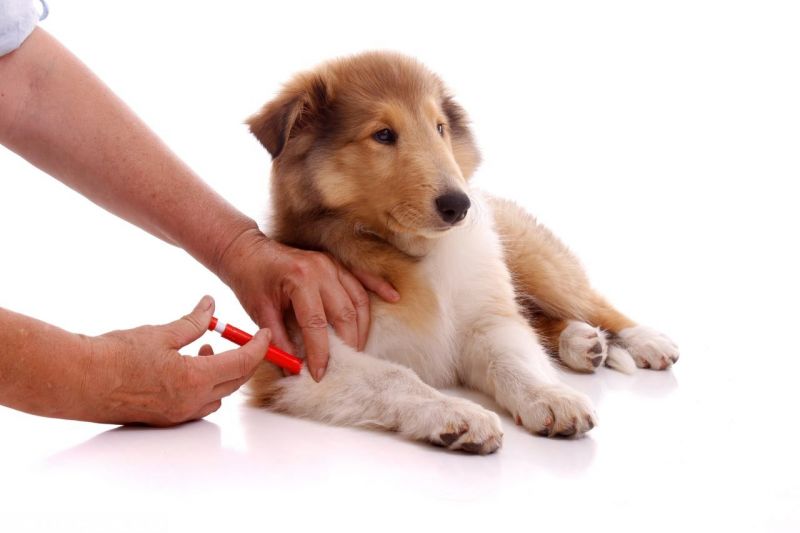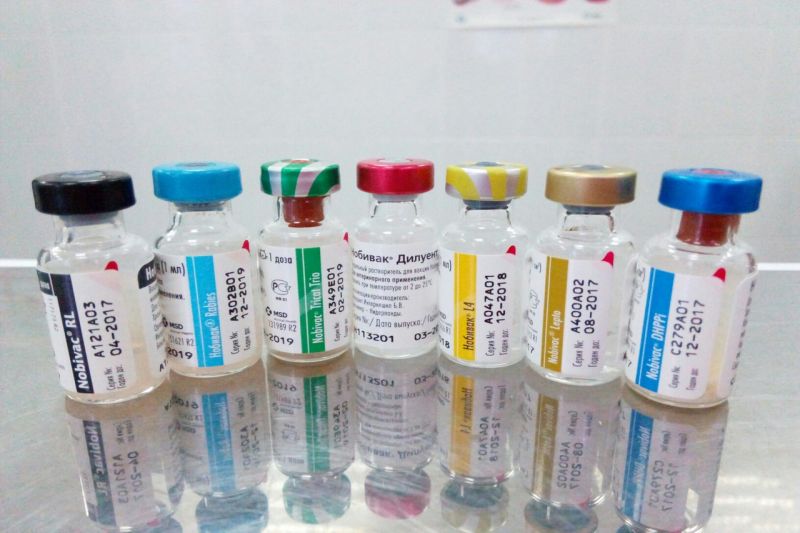A responsible owner cares not only about raising his pet, but also about his health. Proper nutrition, grooming of hair, teeth, ears, eyes and nails is important. But of particular importance is timely vaccination. We tell you for what purpose and when to vaccinate dogs.
_120x126.jpg) Why do dogs need vaccinations?
Why do dogs need vaccinations?
There are many known diseases that can lead to the death of a tailed friend. In addition, some of them are transmitted to humans. Proper vaccination (prevention) helps to avoid the risk of infection with dangerous ailments.

Pathogens can enter the body through contact with other animals (for example, through infected saliva), as well as sniffing excrement. And some dogs can “pick up” some pathogenic organisms from the surface of the soil or from insect vectors.
Basic Dog Vaccinations
Dogs of all breeds are recommended to be vaccinated against such ailments as:
Plague of carnivores. It is very difficult to treat, and with a favorable outcome (although such cases, unfortunately, are quite rare), complications arise that significantly shorten life.
Rabies. By law, all pet owners are required to vaccinate their pets against this ailment, since it is incurable, always ends in death and can be transmitted to humans.
Parvovirus enteritis. This disease of the gastrointestinal tract quickly leads to dehydration and is difficult to treat. Ill puppies who have not yet formed immunity die.
Infectious hepatitis (Rubart's disease). This infectious inflammation of the liver gives complications to other organs.
Adenovirus infection. The causative agent of the disease is adenovirus of the second type.
Parainfluenza It affects the upper respiratory tract. Rarely leads to an imminent death, but is practically not treated. In a sick animal, you can only alleviate the symptoms (cough, mucus from the nose), and this will have to be done throughout his life. In addition, there is a risk of developing pneumonia.
Leptospirosis. It is difficult to treat, often leading to chronic renal failure.
_120x127.jpg) Understanding vaccines for dogs
Understanding vaccines for dogs
Vaccines for the most dangerous and common diseases are sold at the veterinary pharmacy, and in many veterinary clinics they can be purchased locally. Do not vaccinate the animal yourself, entrust this matter to a specialist. In addition, the animal’s veterinary passport must bear a mark on the passage of vaccination, certified by the seal of the veterinarian or clinic. This primarily concerns rabies.

How to buy the right vaccine if you want to buy it yourself (even before you receive it from your veterinarian)? Each manufacturer, using Latin letters, indicates ampoules, against which it is intended:
D - plague of carnivores;
H - Rubart's disease;
P - parvovirus enteritis;
L, or Lepto - leptospirosis;
R is rabies;
Pi is parainfluenza.
To give your dog a comprehensive vaccine against dangerous ailments, buy medications labeled DHPPi (several vaccines are in the same vial), Lepto and Rabies. Puppies are vaccinated with the same vaccines, but the very first one is slightly different - Puppy DP. It is made by the breeder in 1-1.5 months.
 Dog vaccination rules
Dog vaccination rules
The entire complex is repeated annually. So, every time you need to buy 3 ampoules with vaccines. An exception may only be made for Lepto. Veterinarians say that a pet older than 2 years can not be vaccinated against leptospirosis (or do it every other time) if it does not walk without your supervision and does not come into contact with rodents - they are the main carriers of leptospira (bacteria). However, if there is a vaccine in a veterinary pharmacy, it is better not to risk it and vaccinate against leptospirosis every year.
As a rule, puppies are given to families already vaccinated by age. But do not forget to check with the breeder this moment or look at the records in the veterinary certificate.
The fact is that puppies are given several vaccinations, and the scheme for their administration may vary depending on the manufacturer of the drug and the time when the breeder carried out the first procedure. At the age of 6-7 months, the puppy is vaccinated against rabies (R), but note that it is not recommended to be vaccinated during a tooth change. Therefore, sometimes pets are vaccinated a little later (about 8 months) or earlier - at 4-5.
Remember! Before each vaccination, for 10-14 days it is necessary to give an anthelmintic drug, since only a healthy animal can be vaccinated. The increased body temperature of the pet and any symptoms of malaise are a reason to postpone this procedure.
For two weeks after vaccination, the dog's immunity is weakened, so the pet is protected from hypothermia. It is not recommended to bathe the dog, even if it’s summer in the yard, and take it for long walks in bad weather.
Do not endanger the health of your animal! Do not forget about the annual vaccination and follow the advice of a veterinarian.
 Select language
Select language 





.jpg)
.jpg)
.jpg)
.png)
